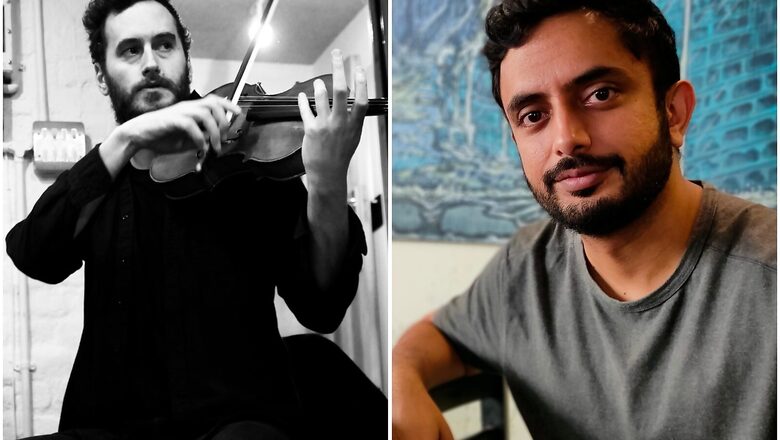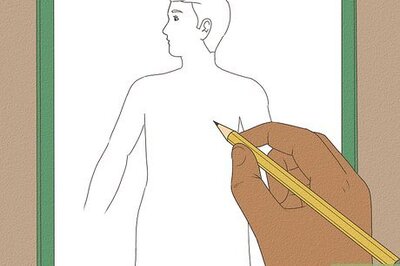
views
A lot goes into the making of a film beyond what we see on screen. While the actors and the director hog most of the limelight, several other artists and technicians, depending on the size of the production, work tirelessly on and off the sets to bring a project to fruition. New departments are being created besides the traditional costume, music, cinematography, etc, as filmmaking evolves around the world.
This News18 series, Off-screen Stars, is to celebrate people working behind the camera during production, as well as those performing various pre- and post-production jobs, that are essential for a project to come alive.
The subtle background score of Sherni, the eerie sounds of Ghoul, or the trippy tunes of Udta Punjab – composer duo Benedict Taylor and Naren Chandavarkar have been adding to our movie watching experience with their talents from behind-the-scenes. The contribution of these background artists have become even more significant with the OTT boom, where music is more part of the narrative flow than a forced inclusion, like a song-and-dance sequence. Some of their most recent work on streaming platforms include web series Pataal Lok, Betaal and anthology series Ray.
Naren is based in Mumbai, while Benedict, a well-known violinist who happens to be actress Radhika Apte’s spouse, is from London. Despite being divided by distance and cultures, the two continue to string together the same tune that enhances the storytelling experience on screen. The duo spoke to News18 about the changing attitude of filmmakers towards background score and the scope OTT has given them.
With the change in content, has the makers’ attitude towards background score?
Naren: The kind of projects that get greenlit has changed and allowed us to have the opportunity to do more on a larger scale, or projects that are reaching a wider audience and treat them with the kind of work and sensitivity that we would have always wanted to. The big thing that’s changing is the possibilities that are allowed for us to express that, the kinds of stories that we can work on, the kinds of projects that are getting money.
Benedict: With the changing nature of songs or so-called film music, as opposed to background score, I suppose that might have changed in the filmmakers’ minds to some extent and opening up how people want to use score, and want to use bigger and smaller pieces of music at certain points, which may or may not have been a song earlier.
Has the OTT boom increased the scope for your work as well?
Naren: We’ve had projects in the OTT space that have been more cerebral and some which are more fun, like a horror film or something, which is a very different from a series like Paatal Lok, which is, again, very different from a film like Sherni, which is also different from a project like Ray. So I think we’ve been quite lucky to be part of this process, this wave or boom, or whatever it is, of this new kind of storytelling, where we’ve had a chance to work on varied projects, sometimes with the same collaborators as well, and it’s a lot of fun to sink your teeth into something that’s very different from anything you’ve done before. Like the score of Abhishek Chaubey’s film Hungama Hai Kyon Barpa in the Ray anthology is different from anything we have done before.
Has Bollywood now recognized the importance of a background score and the composers that work on it?
Naren: With Indian cinema in general – if you look at Satyajit Ray’s films, for example and other independent cinema from across the country – there’s definitely been films that have had background score as a key part. Even in films of the ’50s or ’60s and in many films throughout history. But in the more commercial space, songs have definitely become a lesser part of the storytelling or marketing of a project. So they have less importance in the making of the film. In general, there’s been a shift, not just because of OTT, but it was happening in film before that, as well, towards storytelling, and more director driven and story driven work.
Benedict, being a British avant-garde violist and violinist, how have you managed to adapt to the Indian film industry and its workings?
Benedict: There’s a large Indian influence in the UK that our generation grew up with. You don’t know the ins and outs of these industries, of course, but such things weren’t such a surprise to me. I’d spent time here before Naren and I started working together. We could be working in an Indian film, or a Canadian film, it doesn’t really matter. We’re open to different kinds of music and cinema and judge basis whatever material we need to work on at a given time.
Does having a spouse in the same industry help?
Benedict: I suppose so. I’m sure I get an insight into the way things work, of course, because of that relationship (chuckles).
How do the two of you manage to bridge the physical distance while working, especially during the pandemic?
Benedict: I’ve spent a lot of time in India, as well, and I’m currently in in London. We’ve spent lots of time in the studio, but we’ve also spent a lot of time working remotely. We started the entire process from the two continents. I was doing stuff in London and sending it to Naren, and vice versa. I think there can be quite an interesting driving force in it, there’s something quite magical about that way of working. We’ve been bridging that gap from the very beginning.
Read all the Latest News, Breaking News and Coronavirus News here.

















Comments
0 comment